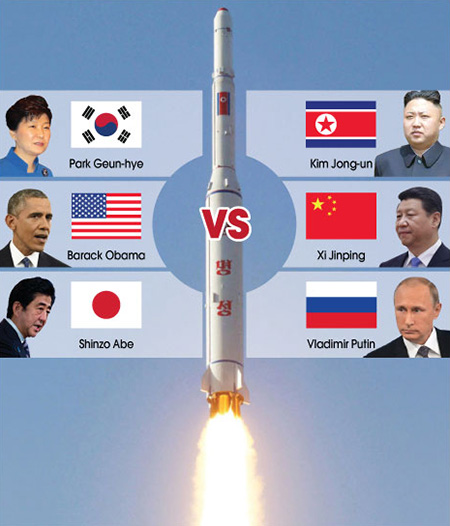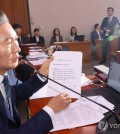- California Assembly OKs highest minimum wage in nation
- S. Korea unveils first graphic cigarette warnings
- US joins with South Korea, Japan in bid to deter North Korea
- LPGA golfer Chun In-gee finally back in action
- S. Korea won’t be top seed in final World Cup qualification round
- US men’s soccer misses 2nd straight Olympics
- US back on track in qualifying with 4-0 win over Guatemala
- High-intensity workout injuries spawn cottage industry
- CDC expands range of Zika mosquitoes into parts of Northeast
- Who knew? ‘The Walking Dead’ is helping families connect
New Cold War looms over Korea
China, Russia protest talks on THAAD after NK missile launch
By Yi Whan-woo
North Korea’s launch of a long-range rocket Sunday, and South Korea’s ongoing talks with the United States over deployment of the terminal high altitude area defense (THAAD) system on the Korean Peninsula are fueling concerns that Northeast Asia could spiral into a new Cold War.
Analysts said Wednesday that the talks between Seoul and Washington concerning THAAD, the U.S. Army’s multi-layered missile shield, could spark tensions between two groups in the region — South Korea, the U.S. and Japan, and North Korea, China and Russia.
South Korea is expected to accelerate talks with the U.S. on THAAD deployment to join the U.S.-led missile defense system in Asia, which already includes Japan.
China and Russia have opposed deployment of THAAD although the U.S. claims its primary aim is to protect its troops in South Korea and more effectively deter North Korea’s missile attacks. The U.S.-led allies suspect North Korea’s rocket program is a cover for tests of U.N.-banned ballistic missile technology.
China and Russia say that THAAD’s long-rang radar could be used to spy on their military activities.
“Both Beijing and Moscow believe that Washington will use THAAD to seize hegemony in the region and they don’t’ want it to happen,” said Park Won-gon, an international relations professor at Handong University. “They will help Pyongyang while being uncooperative with Seoul and Washington in imposing stronger international sanctions against the Kim Jong-un regime.”
Park claimed that Pyongyang’s two Cold War allies may not cooperate in resuming the six-party talks aimed at halting North Korea’s nuclear program. Both China and Russia are members of the dormant nuclear talks, which also include the two Koreas, the U.S. and Japan.
Yang Uk, a senior research fellow at Korea Defense, voiced a similar view.
“China has been against the presence of high-tech U.S military assets such as THAAD on the peninsula and it will employ all means possible to prevent such a system being deployed in South Korea,” he said.
Yang Moo-jin, a professor at the University of North Korean Studies, said “Russia may see the security situation on the peninsula as a second Ukraine crisis if THAAD is deployed.”
The analysts, however, said China and Russia are not likely to form a joint missile defensive shield along with North Korea.
“Such an act will be against the U.N. resolutions on North Korea’s missile program.”
The Ministry of National Defense announced Sunday that it will officially discuss with U.S. authorities the possibility of setting up a THAAD battery in South Korea on one of the U.S. Forces Korea bases.
The South Korean military authorities said such a battery and its TPY-2 TM radar will only be used in detecting North Korea’s missile-related activities.
Seoul previously maintained the so-called “3-Nos” stance concerning THAAD, underscoring that there have been no consultations between Seoul and Washington, no requests made by the U.S. to open dialogue, and no decisions made.
President Park Geun-hye and Defense Minister Han Min-koo later cited the need for THAAD after North Korea’s Jan. 6 nuclear test.
The President also vowed to take stronger sanctions against North Korea in telephone conversations with U.S. President Barack Obama and Japanese Prime Minister Shinzo Abe, Tuesday.
Meanwhile, the foreign ministries of China and Russia summoned South Korean ambassadors in their respective countries — Kim Jang-soo in Beijing, Sunday, and Park Ro-byug in Moscow, Tuesday, to protest Seoul’s joint discussions with Washington over THAAD.
















